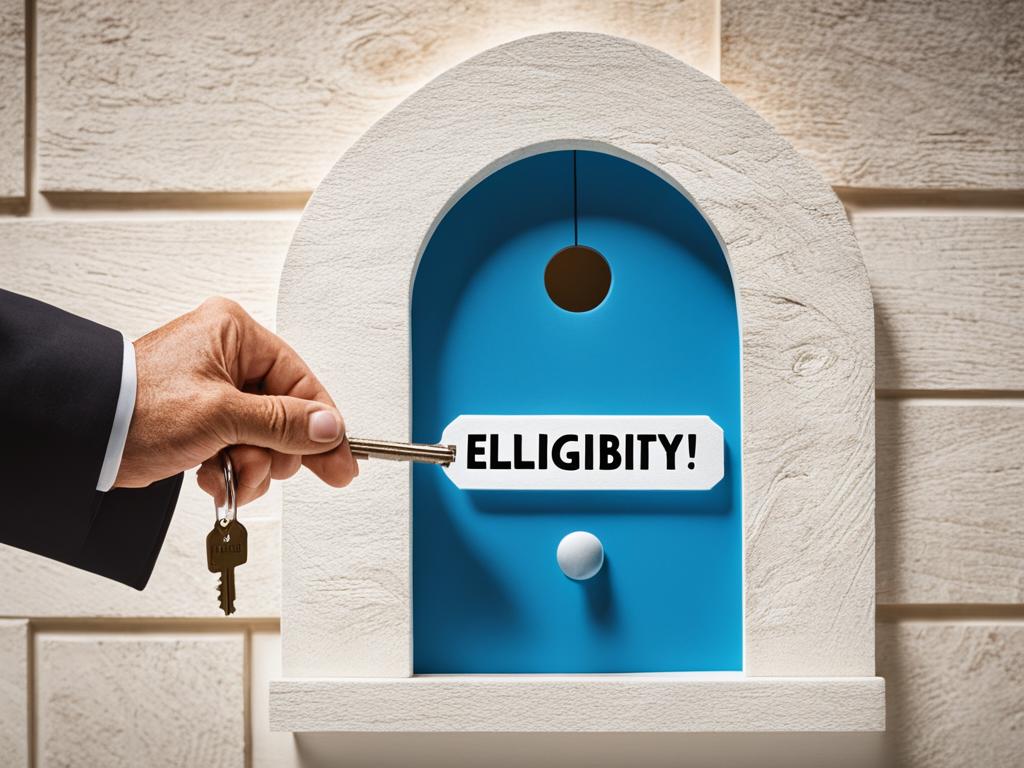Reverse Jumbo Mortgage: Unlock Large Home Equity
A reverse jumbo mortgage is a financial solution that allows older homeowners with high-value properties to tap into a substantial portion of their home equity. Unlike government-insured reverse mortgages, which have borrowing limits, a jumbo reverse mortgage enables borrowers to access up to $4 million of their home’s equity.
To qualify for a reverse jumbo mortgage, homeowners typically need to meet certain eligibility requirements. These include owning more than 50% of the home equity, residing in the property as a primary residence, and being at least 55 years old. The loan amount available to borrowers is determined based on factors such as the appraised value of the home, the amount of equity owned, and the borrower’s age.
Repayment of a reverse jumbo mortgage is triggered by specific events, such as the borrower’s passing away or selling the property. This type of mortgage provides older homeowners the opportunity to unlock their significant home equity for various financial needs, whether it’s paying off existing debts, funding retirement, or investing in opportunities.
Key Takeaways:
- A reverse jumbo mortgage allows older homeowners with high-value properties to access up to $4 million of their home equity.
- Eligibility requirements for a reverse jumbo mortgage typically include owning more than 50% of the home equity, living in the home as a primary residence, and being at least 55 years old.
- The loan amount available is determined by factors such as the appraised value of the home, the amount of equity owned, and the borrower’s age.
- Repayment of a reverse jumbo mortgage is triggered by specific events, such as the borrower’s passing away or selling the property.
- A reverse jumbo mortgage provides financial flexibility for homeowners with high-value properties, allowing them to meet various financial needs.
How Does a Jumbo Reverse Mortgage Work?
A jumbo reverse mortgage is specifically designed for older homeowners with high-value properties who require access to a larger portion of their home equity than what government-insured reverse mortgages offer. While the basic function of a jumbo reverse mortgage is similar to a traditional reverse mortgage, there are notable differences that borrowers should be aware of.
Basic Function:
A jumbo reverse mortgage allows homeowners to receive a portion of their home’s current value, minus any liens, in various forms such as a lump sum, monthly payments, or a line of credit. These funds can be used for various purposes, including home renovations, medical bills, or supplementing retirement income. The exact terms and conditions of a jumbo reverse mortgage can vary from lender to lender, offering borrowers more flexibility in choosing the loan structure that best suits their financial needs.
Less Regulation:
Compared to government-insured reverse mortgages, jumbo reverse mortgages typically have less regulation. This means that lenders have the freedom to set their own eligibility requirements, loan terms, interest rates, and fees. It’s essential for borrowers to carefully review and compare the offerings from different lenders to ensure they find the most favorable terms for their individual circumstances.
Eligibility Requirements:
The eligibility requirements for a jumbo reverse mortgage can also vary depending on the lender. Generally, borrowers must meet certain criteria such as age and home equity ownership. While the age requirement is typically set at 55 or older, some lenders may have different age thresholds. Additionally, borrowers must typically own more than 50% of the home equity to qualify for a jumbo reverse mortgage.
To visualize the key differences between a jumbo reverse mortgage and a traditional reverse mortgage, refer to the table below:
| Key Differences | Jumbo Reverse Mortgage | Traditional Reverse Mortgage |
|---|---|---|
| Borrowing Limits | Higher limits, up to $4 million | Lower limits, depending on FHA guidelines |
| Regulation | Less regulation, terms vary by lender | Strict regulations by the FHA |
| Eligibility Requirements | Vary by lender, typically age 55+, more than 50% home equity ownership | Mandated by FHA, age 62+, sufficient home equity ownership |
Pros and Cons of a Jumbo Reverse Mortgage
Jumbo reverse mortgages offer both benefits and risks. Understanding these can help borrowers make informed decisions regarding their financial needs.
Benefits of Jumbo Reverse Mortgages
- The ability to borrow larger amounts of money: With jumbo reverse mortgages, homeowners can access up to $4 million of their home equity, providing financial flexibility for various purposes.
- No mortgage insurance requirement: Unlike government-insured reverse mortgages, jumbo reverse mortgages do not require borrowers to pay mortgage insurance premiums, potentially saving them money in the long run.
- Access to funds at a younger age: Jumbo reverse mortgages may allow homeowners to access their home equity as early as 55 years old, providing earlier financial freedom.
Risks of Jumbo Reverse Mortgages
- Higher borrowing costs: Jumbo reverse mortgages typically come with higher interest rates and fees compared to traditional mortgages, potentially resulting in increased borrowing costs over time.
- Less borrower protections: Government-insured reverse mortgages have certain borrower protections and guarantees that may not be available with jumbo reverse mortgages, exposing borrowers to potential risks.
- Potential scams: As with any financial product, there is a risk of scams or unethical practices in the jumbo reverse mortgage market. Borrowers should be cautious and work with reputable lenders.
- Less flexible payment options: Jumbo reverse mortgages may offer fewer options for receiving funds, limiting the flexibility for homeowners to choose the payment method that best suits their needs.
It’s important for borrowers to carefully weigh the benefits and risks of jumbo reverse mortgages before committing to this financial option. Consulting with financial advisors and trusted professionals can provide valuable insights and ensure that this type of mortgage aligns with their individual goals and circumstances.

Jumbo Reverse Mortgage Limits and Eligibility
When considering a jumbo reverse mortgage, it is essential to understand the limits and eligibility requirements associated with this type of loan. The jumbo reverse mortgage allows borrowers to access up to $4 million of their home equity, but there are specific criteria that borrowers must meet.
To be eligible for a jumbo reverse mortgage, borrowers commonly need to:
- Own more than 50% of their home equity
- Live in the home as a primary residence
- Be at least 55 years old
In addition to these requirements, the appraised value of the home and the borrower’s age play a significant role in determining the loan amount. Lenders evaluate these factors to ensure that borrowers have enough capital tied up in their homes to qualify for a jumbo reverse mortgage.
Here is a table illustrating the maximum loan limits for jumbo reverse mortgages based on different age ranges:
| Age Range | Maximum Loan Limit |
|---|---|
| 55-60 | $2,000,000 |
| 61-65 | $2,500,000 |
| 66-70 | $3,000,000 |
| 71 and above | $4,000,000 |
It’s important to note that these limits are subject to change and may vary depending on the lender. Borrowers should consult with lenders to get accurate and up-to-date information about jumbo reverse mortgage limits and eligibility requirements.
By meeting the eligibility criteria and understanding the loan limits, borrowers can determine if a jumbo reverse mortgage is the right financial decision for their unique circumstances.
Benefits of a Jumbo Reverse Mortgage
A jumbo reverse mortgage offers numerous benefits for homeowners with high-value properties, providing them with increased financial flexibility and access to a larger portion of their home equity. By leveraging the advantages of a jumbo reverse mortgage, homeowners can optimize their borrowing potential, unlock substantial funds, and enjoy a range of additional benefits.
1. Access to More Home Equity
One of the primary benefits of a jumbo reverse mortgage is the ability to access up to $4 million of home equity. This is particularly advantageous for homeowners with high-value properties, as it allows them to tap into a significant amount of wealth that would otherwise be tied up in the property. By accessing a larger portion of their home equity, homeowners can fund various financial goals, such as home renovations, debt consolidation, healthcare expenses, or simply enhancing their quality of life.
2. Increasing Loan-to-Values (LTVs)
Jumbo reverse mortgages also offer the advantage of increasing loan-to-values (LTVs) with age. As homeowners grow older, the loan-to-value ratios for jumbo reverse mortgages rise, allowing them to access a higher percentage of their home’s appraised value. This can be especially beneficial for retirees or older homeowners who may require additional funds to support their retirement lifestyle or cover unforeseen expenses. The increasing LTVs provide a valuable option for those in need of greater financial flexibility later in life.
3. Lower Closing Costs
Compared to traditional reverse mortgages, jumbo reverse mortgages often come with lower closing costs. This is primarily because jumbo reverse mortgages do not require mortgage insurance premiums, which can significantly reduce the upfront costs associated with the loan. The elimination of mortgage insurance premiums allows homeowners to save on expenses and retain a higher portion of their borrowed funds, making jumbo reverse mortgages an even more attractive option for those looking to maximize their financial resources.
Overall, the benefits of a jumbo reverse mortgage can make a significant difference in the financial well-being of homeowners with high-value properties. By leveraging these benefits, homeowners can take advantage of their accumulated equity, access larger sums of money, and enjoy a higher level of financial security and flexibility in their retirement years.

| Benefits of a Jumbo Reverse Mortgage |
|---|
| Access to More Home Equity |
| Increasing Loan-to-Values (LTVs) with Age |
| Lower Closing Costs |
Risks of a Jumbo Reverse Mortgage
While jumbo reverse mortgages offer benefits, it’s crucial to understand and consider the associated risks before making a decision. Here are some key risks to be aware of:
1. Higher Borrowing Costs
Compared to government-insured reverse mortgages, jumbo reverse mortgages often come with higher interest rates and origination fees. These costs can significantly impact the overall amount that borrowers will owe over time.
2. Fewer Borrower Protections
Unlike government-insured reverse mortgages, jumbo reverse mortgages have fewer borrower protections in place. This means that borrowers may have limited recourse if they encounter issues with their loan or lender.
3. Potential Scams
As with any financial product, there is a risk of scams and fraudulent activities in the jumbo reverse mortgage market. Borrowers should be cautious and thoroughly research lenders before committing to any loan agreement.
4. Less Flexible Payment Options
Jumbo reverse mortgages may offer fewer payment options compared to government-insured reverse mortgages. Borrowers may have limited flexibility in choosing how they receive their funds, whether as a lump sum, monthly payments, or a line of credit.
It’s essential for borrowers to carefully review the terms and conditions of a jumbo reverse mortgage and consider consulting with trusted advisors, such as financial planners or HUD-approved reverse mortgage counselors, to ensure they understand the risks involved and make an informed decision.
- Consumer Financial Protection Bureau
- Investopedia
- U.S. Department of Housing and Urban Development
Jumbo Reverse Mortgage Market Outlook
After the housing bubble burst in 2008, the jumbo reverse mortgage market experienced a significant decline. However, in recent years, the market has seen a resurgence due to favorable factors such as low-interest rates and changes to FHA lending limits. This has paved the way for new jumbo reverse mortgage programs that offer unique rates, terms, and features, allowing high-value homeowners to access more of their home equity.
These emerging programs in the jumbo reverse mortgage market cater specifically to the needs of homeowners with substantial home values. With borrowing limits of up to $4 million, these mortgages provide an attractive option for those looking to tap into their home’s equity. The jumbo reverse mortgage market continues to evolve, with different lenders offering a variety of guidelines, interest rates, and loan options to accommodate the individual circumstances of high-value homeowners.

What is a Jumbo Reverse Mortgage? Explained
A jumbo reverse mortgage is a specialized loan option tailored to homeowners with high-value properties who wish to tap into a larger amount of their home equity than what traditional reverse mortgages allow. Unlike FHA-insured reverse mortgages, jumbo reverse mortgages have different rules and higher borrowing limits, offering borrowers greater flexibility and access to funds. Understanding the definition and loan options available is essential for homeowners considering a jumbo reverse mortgage.
Unlike conventional reverse mortgages, which are regulated by the FHA, jumbo reverse mortgages are not subject to the same restrictions. These loans are often used by homeowners who have substantial equity in their homes and need access to a larger amount of money. With a jumbo reverse mortgage, borrowers can typically obtain funds as a lump sum, monthly payments, or a line of credit, depending on the terms set by the lender.
To gain a comprehensive understanding of jumbo reverse mortgage loan options, homeowners should research and compare different lenders. Each lender may offer various loan terms, interest rates, and fees, so it’s crucial to consider individual financial goals and preferences. By exploring the available loan options, borrowers can make an informed decision that aligns with their specific needs and circumstances.
It’s worth noting that jumbo reverse mortgages require careful consideration, as they may involve higher costs and potentially less borrower protection compared to government-insured reverse mortgages. This underscores the importance of thorough research, seeking advice from trusted financial advisors, and fully understanding the terms and conditions before entering into a jumbo reverse mortgage agreement.

In summary, a jumbo reverse mortgage is an alternative funding option for homeowners with high-value properties to access a larger portion of their home equity. The flexibility in loan options and higher borrowing limits make it an appealing choice for those who require substantial financial resources. However, it’s crucial for homeowners to carefully evaluate the loan terms, costs, and potential risks to determine if a jumbo reverse mortgage is the right fit for their financial needs and long-term goals.
Pros and Cons of a Jumbo Reverse Mortgage Loan
Jumbo reverse mortgages offer several advantages for homeowners who are considering accessing their home equity. However, like any financial product, they also come with certain drawbacks. It’s important for prospective borrowers to weigh these pros and cons carefully before making a decision.
Pros of Jumbo Reverse Mortgages
- Higher borrowing limit: Jumbo reverse mortgages allow homeowners to access more money compared to traditional reverse mortgages. With borrowing limits of up to $4 million, borrowers can tap into a larger portion of their home equity.
- No mortgage insurance requirement: Unlike government-insured reverse mortgages, jumbo reverse mortgages do not require borrowers to pay mortgage insurance premiums. This can lead to significant savings over the life of the loan.
- Accessibility at a younger age: Jumbo reverse mortgages may be available to borrowers as young as 55 years old, providing earlier access to home equity for financial planning and retirement purposes.
Cons of Jumbo Reverse Mortgages
- Higher borrowing costs: Jumbo reverse mortgages often come with higher interest rates and upfront fees compared to traditional reverse mortgages. Borrowers should carefully consider the overall cost of borrowing before proceeding.
- Fewer borrower protections: Unlike government-insured reverse mortgages, jumbo reverse mortgages have fewer regulatory protections. Borrowers should carefully review the terms and conditions of the loan and ensure they understand their rights and responsibilities.
- Potential scams: The jumbo reverse mortgage market is not immune to scams or unethical practices. Borrowers should be cautious when choosing a lender and seek advice from trusted financial professionals before committing.
- Less flexible payment options: Jumbo reverse mortgages may offer fewer payment options compared to traditional reverse mortgages. Borrowers should ensure they understand the available choices and select a loan that aligns with their financial goals.
By carefully considering these pros and cons, homeowners can make an informed decision about whether a jumbo reverse mortgage is the right solution for their financial needs. It’s always recommended to consult with trusted financial advisors and explore multiple offers from reputable lenders before finalizing any loan agreement.
How to Qualify for a Jumbo Reverse Mortgage
Qualifying for a jumbo reverse mortgage requires meeting certain eligibility requirements set by the lender. While specific criteria may vary, there are common conditions that borrowers should consider when applying for this type of loan:
- Owning more than 50% of home equity: To be eligible for a jumbo reverse mortgage, homeowners typically need to have a significant portion of their home’s value tied up in equity. This ensures that the loan amount is backed by sufficient collateral.
- Living in the home as a primary residence: Jumbo reverse mortgages are designed for homeowners who intend to remain in their current residence. Lenders usually require borrowers to demonstrate that the property is their primary dwelling.
- Being at least 55 years old: Age is a factor in jumbo reverse mortgage eligibility. Borrowers typically need to be at least 55 years old to qualify for this type of loan. The older the borrower, the higher the loan amount they may be eligible for.
In addition to these requirements, jumbo reverse mortgage lenders consider the appraised value of the home and the borrower’s age when determining the loan amount. It’s essential for prospective borrowers to consult with lenders and obtain a clear understanding of the specific eligibility requirements and documentation needed to qualify for a jumbo reverse mortgage.

Example Eligibility Criteria for a Jumbo Reverse Mortgage
While eligibility requirements may differ based on the lender, the following table provides an example of criteria for a jumbo reverse mortgage:
| Eligibility Criteria | Specific Requirement |
|---|---|
| Minimum Age | 55 years or older |
| Ownership Percentage | Own more than 50% of home equity |
| Primary Residence | Live in the home as a primary residence |
Please note that this is just an example, and actual eligibility requirements may vary depending on the lender. It is crucial to consult with lenders directly to understand their specific criteria and documentation requirements.
Conclusion
A reverse jumbo mortgage can be a valuable financial tool for homeowners with high-value properties who are looking to access a larger portion of their home equity. By allowing borrowers to borrow up to $4 million, this type of mortgage provides the flexibility to eliminate larger mortgage balances and access significant funds for various purposes.
However, it is crucial for borrowers to understand the associated risks involved in jumbo reverse mortgages. These risks can include higher borrowing costs and potentially fewer borrower protections compared to government-insured reverse mortgages. Therefore, it is essential for individuals considering a reverse jumbo mortgage to carefully review the terms and conditions, as well as consult with trusted advisors, to make an informed decision.
Overall, a reverse jumbo mortgage can offer significant benefits to eligible borrowers, such as increased borrowing limits and expanded financial opportunities. Nevertheless, it is important to approach this financial solution with a thorough understanding of the potential risks involved. By weighing the pros and cons and seeking professional guidance, homeowners can make the best decision regarding their financial future, utilizing the full potential of their high-value properties.
FAQ
What is a reverse jumbo mortgage?
A reverse jumbo mortgage allows older homeowners with high-value properties to borrow up to $4 million of their home equity. It has higher borrowing limits and fewer regulations compared to government-insured reverse mortgages.
How does a jumbo reverse mortgage work?
A jumbo reverse mortgage works similarly to a traditional reverse mortgage. Homeowners can receive their home’s current value minus any liens as a lump sum, monthly payments, or a line of credit. However, jumbo reverse mortgages have less regulation and can vary in terms and conditions from lender to lender.
What are the pros and cons of a jumbo reverse mortgage?
The pros of a jumbo reverse mortgage include higher borrowing limits, no mortgage insurance requirement, and accessibility at a younger age. However, the cons include higher borrowing costs, fewer protections, potential scams, and less flexible payment options.
What are the limits and eligibility requirements for a jumbo reverse mortgage?
The maximum amount that can be borrowed with a jumbo reverse mortgage is $4 million, but borrowers must have at least that amount of their own capital tied up in their home. Common eligibility requirements include owning more than 50% of home equity, living in the home as a primary residence, and being at least 55 years old.
What are the benefits of a jumbo reverse mortgage?
The benefits of a jumbo reverse mortgage include the ability to access more home equity, no mortgage insurance requirement, and higher loan-to-value ratios with age. It can provide significant financial flexibility for homeowners with high-value properties.
What are the risks of a jumbo reverse mortgage?
The risks of a jumbo reverse mortgage include higher borrowing costs, fewer borrower protections compared to government-insured reverse mortgages, potential scams, and less flexible payment options. Borrowers should carefully review the terms and conditions before making a decision.
What is the outlook for the jumbo reverse mortgage market?
The jumbo reverse mortgage market continues to evolve, with different lenders offering unique guidelines, interest rates, and loan options. Changes to FHA lending limits and low-interest rates have led to the emergence of new jumbo reverse mortgage programs in recent years.
What is a jumbo reverse mortgage and how does it work?
A jumbo reverse mortgage is a type of loan designed for homeowners with high-value properties who want to access more home equity than traditional reverse mortgages allow. It provides flexibility in loan options, such as lump sums, monthly payments, or lines of credit, depending on the lender’s terms.
What are the pros and cons of a jumbo reverse mortgage loan?
The pros of a jumbo reverse mortgage loan include the ability to borrow more money, no mortgage insurance requirement, and accessibility at a younger age. However, the cons include higher borrowing costs, fewer borrower protections, potential scams, and less flexible payment options.
How can I qualify for a jumbo reverse mortgage?
Eligibility requirements for jumbo reverse mortgages vary by lender but commonly include owning more than 50% of home equity, living in the home as a primary residence, and being at least 55 years old. The appraised value of the home and the borrower’s age also play a role in determining the loan amount.
What is the conclusion about reverse jumbo mortgages?
Reverse jumbo mortgages can be a valuable financial tool for homeowners with high-value properties. They provide access to a larger portion of home equity but come with risks such as higher borrowing costs and potentially fewer borrower protections. It’s important to carefully consider the terms and conditions and consult with trusted advisors before making a decision.

